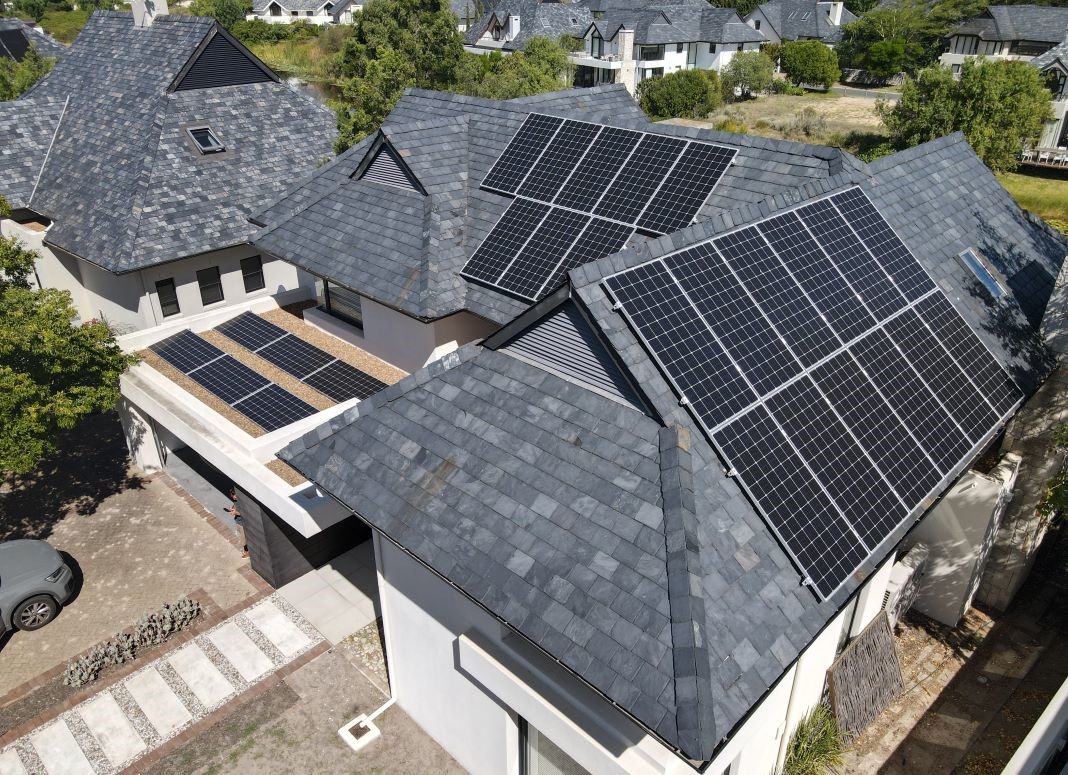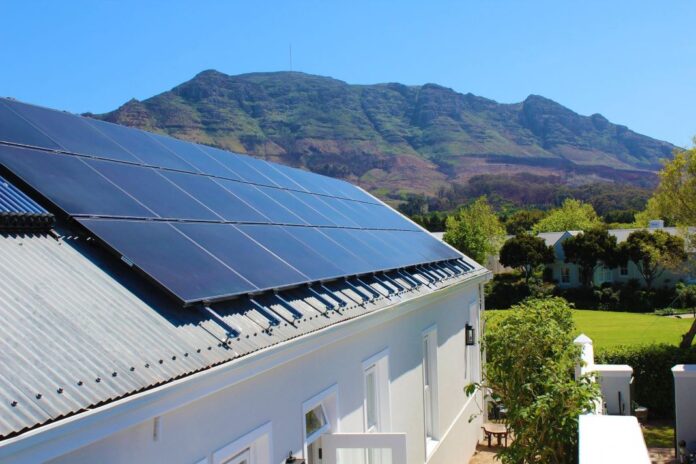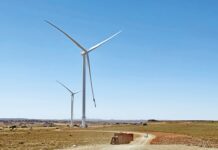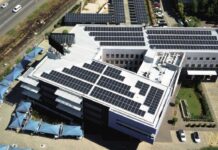South African homeowners now have an opportunity to purchase power from private providers. GreenSun Renewable Energy is offering a power purchase agreement, something that was previously only available to large businesses.
The EnergyEase product is an Energy-as-a-Service offering designed for South African homeowners which allows users to address escalating municipal rates by purchasing the energy produced by their system at a lower cost than local municipal electricity rates.
With EnergyEase, GreenSun installs and owns all necessary solar equipment including panels, inverters, batteries and smart meters. Homeowners purchase the generated solar power through a smart meter and app-based wallet system at a lower price than they would from the local municipality. Initially, each kWh will be slightly cheaper than municipal electricity, but over time, as GreenSun’s rates increase at a slower pace than Eskom’s, the savings will grow significantly.
This launch is timely for South African homeowners facing steep increases in prepaid and post-paid electricity bills. As of April 2024, recent Eskom price hikes, approved by the National Energy Regulator of South Africa (NERSA), have led to an 18.65% increase for 2023/24, followed by an additional 12.74% rise for 2024/25.
Despite these increases, Eskom continues to grapple with reliability issues and energy experts predict that loadshedding will persist. Since loadshedding started in 2008, electricity prices have risen by 450%, far exceeding the 98% inflation rate over the same period. This means that tariff hikes have more than quadrupled the rate of headline inflation, outpacing it by 352%.
EnergyEase represents South Africa’s first, true residential-power purchase agreement, transforming the way energy consumption is approached. Homeowners benefit from lower energy rates and increased reliability, paying only for the energy generated and stored by their system rather than fixed monthly costs, making it a more economical choice compared to the current rate of R4.73 per kWh of the City of Cape Town, for instance.
EnergyEase represents South Africa’s first, true residential-power purchase agreement, transforming the way energy consumption is approached.
The system is equipped to handle high summer energy demands, such as powering air conditioners and pumps, while also offering cost savings during winter when energy production is lower. GreenSun’s backup system ensures comprehensive home connectivity, unlike traditional systems that support only basic lighting and plug points.
EnergyEase features advanced smart metering technology for remote energy management and monitoring. Daily consumption is reconciled and credited, with the convenience of topping up the smart wallet through various payment methods.
Addressing the challenge of frequent loadshedding, EnergyEase provides a reliable power source, ensuring that essential appliances remain operational even during outages. This backup power solution offers security and peace of mind to homeowners.
“We are thrilled to introduce EnergyEase to the South African market,” says Xavier Louw, CEO and co-founder at GreenSun Renewable Energy. “Our aim is to offer a cost-effective, sustainable energy solution that eases the financial burden on homeowners while providing access to reliable and clean energy without upfront costs.”
Benefits of EnergyEase
- Energy independence: Reliable power during loadshedding and outages.
- Significant savings: Lower kWh cost without being tied into a fixed rental monthly fee.
- Environmental impact: Reduced carbon footprint and commitment to sustainable energy.
EnergyEase is ideal for homeowners with monthly electricity bills of R2 500 or more, who seek to reduce costs and ensure a stable power supply.
To learn more about GreenSun Renewable Energy and EnergyEase, visit https://greensun.co.za/energy-ease/

Residential estates can benefit from economies of scale
The opportunities are endless, says Xavier Louw, CEO and co-founder of GreenSun Renewable Energy, of his company’s new EnergyEase offering.
Is energy-as-a-service (EAAS) a growing market?
EAAS or PPA (power-purchase agreement) offerings are becoming more and more popular. The main reasons are that the risk of ownership is completely mitigated for the user as the performance of the system, maintenance and any cost associated with system performance is for the account of the system owner/service provider and not the user. The cost of energy is a function of the system yield and not fixed per month. Seasonal weather conditions play a big part in the monthly performance and associated service fees.
When did you come up with EnergyEase?
We started in 2019 with the idea, but the technology was still too expensive and the electricity rates too low to make it viable. Since then, the cost of hardware has come down, performance of these systems have improved and electricity rates have increased substantially.
Are you looking beyond individual householders?
This EnergyEase solution is very attractive for individual homeowners, but even more so for residential estates where they can benefit from economies of scale. If the billing is done by the estate, with a bulk-meter connection with the municipality, it is even more attractive. The estate can set up different rates for the buying and selling of electricity within the estate, where surplus solar power can be generated by one house and bought by the next house and everything is managed by a smart microgrid controller.
Then we add load management to the system and it will control, for instance, all the geysers in the estate to use maximum solar power to heat up during the day and at night it will use the cheapest time-of-use rate from the municipality to do any further heating for the morning. This can be extended to electric-vehicle charging, the opportunities are endless.
The idea is ultimately to be as self-sufficient as possible and to bring the electrical costs down as much as possible by utilising maximum solar and battery power.
Is there a rent-to-buy option?
There are many rent-to-own options in the market, but we don’t believe that is the best way forward. This again puts all the risk with the home owner, so if the system fails before the rent-to-own period is over they will still be liable for the monthly rent or instalments. The homeowner is also responsible for the system’s performance, so if it doesn’t perform as expected the fixed monthly rental is still due and it’s the homeowner’s responsibility to fix the system.
Are technology upgrades built into the contract?
Since the client only pays for the generated solar power, it will be in our best interest (and the client’s) to ensure the technology used is the best on the market to ensure maximum uptime and yield.
How fast has your business grown?
We’ve grown exponentially over the last couple of years. GreenSun Renewable Energy was founded in 2011 by myself and my brother, Andeon Louw. Our head office is in Cape Town with a branch in Gauteng.
Are you expanding your area of operation?
We are continuously looking at new opportunities, but already have inhouse capacity to service the Western Cape, Gauteng and KwaZulu-Natal.
What were your main divisions of work before this?
GreenSun has always exclusively been active in the solar and storage market as an EPC (engineering, procurement and construction) in the commercial, agricultural and residential sectors. We’ve had lots of learnings, understand the residential market very well and see the benefits this product can bring.
About GreenSun Renewable Energy
GreenSun Renewable Energy has been a trusted name in the renewable energy sector for over 13 years, known for exceptional installations and a commitment to world-class products. The company offers tailored solutions, including on-grid, off-grid and battery-backup-only systems, with a focus on reliability, affordability and environmental sustainability.









